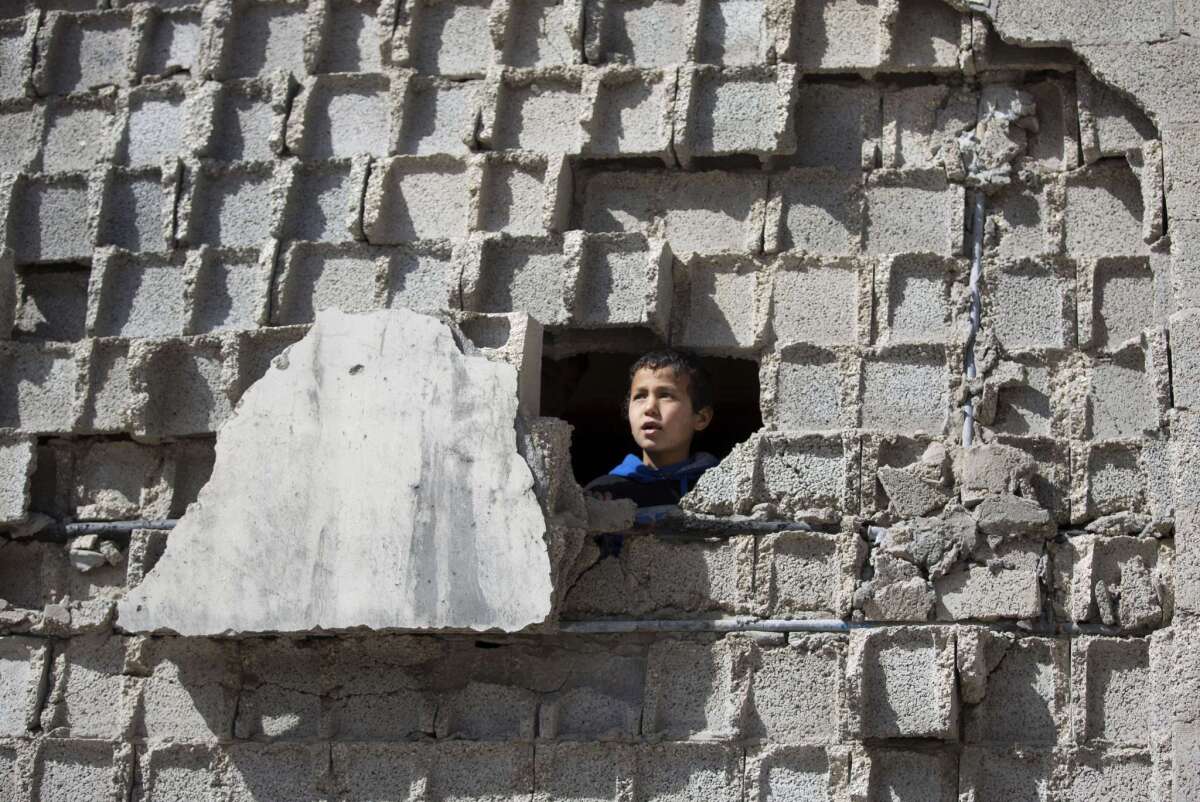Legal expert quits panel investigating possible war crimes in Gaza

- Share via
Reporting from Jerusalem — Facing Israeli charges of bias, international legal expert William Schabas resigned as head of a United Nations panel investigating allegations of war crimes during last summer’s conflict in the Gaza Strip.
The move came before an examination of Israeli complaints that Schabas’ work in 2012 as a legal consultant for the Palestine Liberation Organization raised the possibility of prejudice.
In his letter of resignation, Schabas said his “views on Israel and Palestine” were well known and that his work in defense of human rights has made him “a huge target of malicious attacks.”
In his letter, Schabas said he had been paid $1,300 to write a legal opinion for the PLO connected with the Palestinians’ efforts to gain non-member state status at the United Nations. He denied that the one-time consultancy made him beholden to the PLO and noted that he was working for the U.N. panel without pay.
In an interview Tuesday with Israel Radio, Schabas said the examination of the allegations could take weeks, disrupting the investigation of possible war crimes.
“I was becoming an obstacle and distraction to the work of the commission so I had to get out of the way,” said Schabas, adding the panel only had a few weeks of work left before submitting its report.
The resignation was welcomed in Israel, which fiercely rejected the commission of inquiry, announced by the United Nations Human Rights Council in July while fighting between Israeli forces and Hamas militants was still ongoing.
Israel announced it would not cooperate with the commission due to the rights council’s “obsessive hostility” toward Israel and the panel’s “one-sided mandate.”
The commission was called to investigate “all violations of international humanitarian law and international human rights” in the Palestinian territories and East Jerusalem during Israeli military operations in recent months.
“This is a not a commission of inquiry but rather a committee of foregone conclusions,” Israel’s Foreign Ministry declared.
Israel also protested in a letter to U.N. Secretary-General Ban Ki-moon, saying Schabas, a Canadian-born professor of international law in London, was publicly anti-Israeli.
“My favorite would be [Israeli Prime Minister Benjamin] Netanyahu within the dock of the International Criminal Court,” Schabas was quoted as saying in January 2013.
Netanyahu welcomed the decision and called for an end to the commission’s work altogether. “After the resignation of William Schabas, it is time to shelve the anti-Israeli report his committee wrote.”
The U.N. rights council is an “anti-Israeli body” whose decisions have nothing to do with human rights, Netanyahu said, noting that last year the council “made more decisions against Israel than against Iran, Syria and North Korea combined.”
Foreign Minister Avigdor Lieberman called Schabas’ resignation an achievement for Israeli diplomacy and proof that “even the most hypocritical of international bodies cannot ignore the fact that appointing Schabas to investigate Israel was like asking Cain to investigate Abel’s murder.”
“The damage has been done,” according to Gerald Steinberg, who heads the NGO Monitor group. “The final report will be tainted by Schabas’ leadership until this point,” he said in a statement.
Schabas emphasized that the committee would continue its work. The panel was denied entry to Israel and heard testimony in Amman, Jordan, using electronic communications to hear Palestinians barred from leaving the Gaza Strip. Israelis also traveled to Geneva to testify before the commission about harm they say they suffered from Hamas during the war.
In July and August, Israel waged a military offensive in Gaza aimed at curbing Hamas rocket fire into Israel and destroying the group’s extensive military infrastructure and cross-border tunnels. Massive shelling and airstrikes killed more than 2,100 Palestinians in Gaza -- most of them civilians, according to international agencies -- and left widespread devastation to civilian infrastructure, including homes and schools.
Previously, a report by Amnesty International accused Israel of war crimes during the conflict, and recently the Israeli rights organization B’Tselem slammed Israel’s actions in Gaza as marked by “a black flag of illegality.”
Israel’s military launched its own investigation in July. Teams headed by generals outside the chain of command during the war are reviewing about 100 events that took place during the fighting. So far, the military’s advocate general has ordered criminal investigations of about a dozen cases.
Sobelman is a special correspondent.
More to Read
Sign up for Essential California
The most important California stories and recommendations in your inbox every morning.
You may occasionally receive promotional content from the Los Angeles Times.










